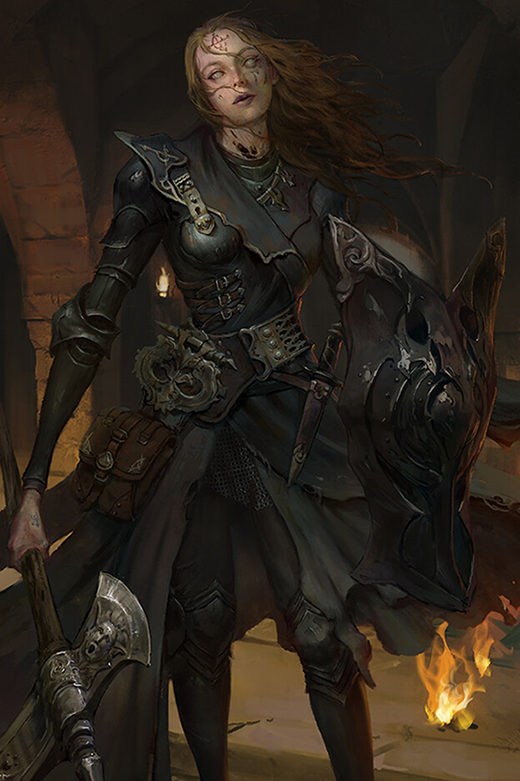Difference between revisions of "Dunash"
| Line 40: | Line 40: | ||
=Culture= | =Culture= | ||
| − | |||
| − | |||
| − | |||
x | x | ||
Revision as of 15:43, 15 October 2021
Contents
Fast Facts
Height: Varies widely, and is entirely based on origin race.
Weight: Varies widely, and is entirely based on origin race.
Lifespan: Eternal
Notable Features: Pearl-Colored Irises, Grey Skin Undertones, Unrecoverable Wounds, Jittery Movements
Player Restrictions: None
Racial Ability: True Undeath: Unlike all other races on Atharen, the Dunash are truly immunized from the consequences of death and aging. They may have their organs cut through, their arms and legs dismembered, and may live for a thousand years; in all cases, they continue to survive. The two reliable ways to kill a Dunash are to decapitate them, or to set them on fire. Few other things can truly kill them, and many have learned to repair their bodies with Necromancy.
Population: 53,000,000, 99% on Icheron; rare in continental Atharen.
History
The Dunash were created with a promise: that they would one be the only men and women left, one day set to rule all of the surface world. The culmination of hundreds of years of purposefully whittling away at subject after subject, crafting, shaping and reshaping them to suit her desires. They were designed to transition mortal from immortal, living and dead to a perpetual state in-between. The Umber Lady, Y'shendra, crafted them with love and hope. Merely one of many races she would create, but finally, her last.
The first of them created went on to be made their King, a pawn by the name of Luther Wayte. Mortals should rule themselves, after all, even if it is only an illusion. Forged piece-by-piece in Bel from the carcass of a mortal man, Y'shendra crafted him to perfection; she stuck her talons into him and learned that no wound could truly subdue him, that he would crawl on his abdomen if not his legs, that he would grab with his teeth if not his hands. He was dismembered, piece by piece, and reconstructed until his construction yielded certainty. Death could not claim him by age or most wounds; he was as impervious as any living thing could ever be. A perfect creation to spite the Living Gods, who would not be able to harness his soul or those who came after him, reaving him of their essence for their selfish needs.
More Dunash were made, and sent out through the Barrengate of Zahn, which Y'shendra had managed to conquer from Valteran. Ten, then twenty, then thousands, they flooded through. In years they washed over the valleys locked within Icheron's desert spires, settling villages, building towns. Like with the Hyr'Norai, they were taught all they needed to know to survive. From beyond the Barrengate, Y'shendra guided them, because she needed to. The first ones were not allowed to have their memories; they would only recall decades of gruesome experimentation, the Imprisoned Goddess toying with their forms, testing their limitations; dismantling and remaking them like bundles of wet clay. For this reason, they were like children, for a time.
Decades went on. More Dunash were incorporated; these ones through war, the undead villages filling Icheron's interior waging war on the settlements of the living. Each man, woman or child they killed, they took back to their home to be reanimated by one of Y'shendra's Knights. Instilled with the power to convert both living and dead to Dunash, they offered peaceful conversions, but met denial with swift retribution. Like a plague, the undead horde washed over the eastern coast of Icheron, culling and converting millions to their order. Infants nor elders were spared. An entire Kingdom was filled before long with undead, and without the need to eat nor much ability to suffer fatigue, the horde continued to rapidly expand.
Though few know the exact month or day the Dunash were plunged into Icheron, scholars of the few surviving nations estimate that they overcame the Kingdom of Samara in the Year 4594, estimated at less than a decade after their emergence. Within six more years, by the turn of the century, they had conquered more than a third of all Icheron. The Dunash forged their own Empire: Astravan, with the capital of Y'lir-Kuznetsk.
Ten years, twenty years flew by; present day came. By the end of 4619, the entire continent had gone dark to the outside world. Few nations survive, meager holdouts, desperately resisting the ceaseless hordes of the undead. The brief history of the Dunash is one of conquest, assimilation, and change.
Physiology/Biology
x
Psychology
x
Culture
x
Clothing, Grooming and Art
x
Religion and Worship
x
Reproduction, Aging, and Death
x
Language
x
